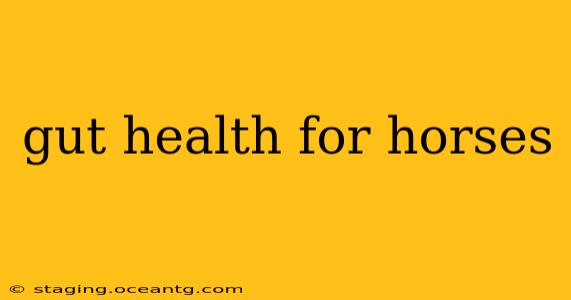Maintaining optimal gut health is crucial for a horse's overall well-being. A healthy digestive system ensures efficient nutrient absorption, strong immunity, and vibrant energy levels. However, equine digestive systems are complex and susceptible to various issues. This comprehensive guide explores the intricacies of equine gut health, offering insights into maintaining a thriving digestive tract and recognizing potential problems.
What are the key components of a horse's digestive system?
A horse's digestive system is unique, characterized by a long, complex tract designed to efficiently process fibrous plant matter. Key components include:
- Mouth: Initial breakdown of food through chewing.
- Esophagus: Transports food to the stomach.
- Stomach: Relatively small in size compared to the overall digestive system, responsible for initial chemical digestion.
- Small Intestine: Major site of nutrient absorption.
- Large Intestine (Cecum, Large Colon, Small Colon, Rectum): Primarily responsible for fermentation of fiber, water absorption, and formation of feces. The cecum, a large pouch at the beginning of the large intestine, plays a crucial role in microbial fermentation.
What are the common signs of poor gut health in horses?
Recognizing signs of poor gut health is essential for timely intervention. Common indicators include:
- Changes in appetite: Loss of appetite, increased appetite, or picky eating.
- Diarrhea or constipation: Changes in stool consistency and frequency.
- Colic: Abdominal pain, which can range in severity from mild discomfort to life-threatening emergencies.
- Weight loss or loss of body condition: Indicates inadequate nutrient absorption.
- Dull coat: A lackluster coat can signal underlying health problems, including poor gut health.
- Lethargy and decreased performance: A horse with poor gut health may appear less energetic and perform poorly.
How can I improve my horse's gut health through diet?
Dietary management is paramount for maintaining a healthy equine gut. Key considerations include:
- High-quality forage: Providing access to plenty of high-quality hay or pasture is foundational. This provides the necessary fiber for optimal microbial fermentation in the cecum and large intestine.
- Gradual feed changes: Sudden dietary shifts can disrupt the gut microbiome, potentially leading to digestive upset. Introduce new feeds slowly to allow the horse's digestive system to adapt.
- Adequate water intake: Ensure consistent access to fresh, clean water. Dehydration can negatively impact digestive function.
- Balanced mineral and vitamin supplementation: Consult with a veterinarian to determine if any supplementation is necessary based on your horse's individual needs and diet.
- Avoiding excessive treats: While treats can be a part of a horse’s diet, overfeeding sugary or high-starch treats can negatively impact gut health.
What are some common gut health problems in horses?
Several factors can compromise equine gut health. These include:
- Parasite infestations: Internal parasites can damage the intestinal lining, leading to malabsorption and diarrhea. Regular deworming is essential.
- Bacterial infections: Various bacterial infections can cause digestive upset and more serious complications.
- Colic: This encompasses a broad range of abdominal pain conditions, many of which stem from digestive issues.
- Sand impaction: Horses can ingest sand, which can accumulate in the digestive tract, causing blockages and other problems.
What role does the microbiome play in a horse's gut health?
The gut microbiome, the complex community of microorganisms residing within the digestive tract, plays a vital role in equine health. These microorganisms aid in fiber digestion, nutrient synthesis, and immune system modulation. A diverse and balanced microbiome is crucial for optimal gut function.
What are some natural ways to support gut health in horses?
In addition to dietary management, several natural approaches can support gut health:
- Probiotics: These beneficial bacteria can help restore balance to the gut microbiome.
- Prebiotics: These are non-digestible food ingredients that promote the growth of beneficial bacteria.
- Yeast supplements: Certain yeast supplements can support digestive function. Always consult with a vet before starting any supplementation.
When should I consult a veterinarian about my horse's gut health?
Any significant changes in your horse's behavior, appetite, or stool consistency warrant veterinary attention. Prompt veterinary care is crucial in addressing colic, severe diarrhea, and other serious digestive issues.
Disclaimer: This information is for general knowledge and should not be considered veterinary advice. Always consult with a qualified veterinarian for any concerns regarding your horse's health. They can perform a thorough examination, diagnose any underlying issues, and recommend appropriate treatment strategies.
